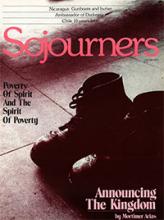A number of years ago, by a process I can neither explain nor retrace, I chose to be poor. That decision has both puzzled and exalted me, given me hope and borne despair, inspired me and left me cold. I have never been really poor, never destitute, or hopeless, or utterly marginal. I have come no closer to starvation than the average American and have no real fear that I will come any closer. And what I now live cannot be called "poverty" in any sense the really poor would recognize. When I chose poverty, I knew St. Francis, and I had had some contact with the poverty of the world around me. But there the puzzle starts. No enthusiasm for the Poverello ("Little Poor Man") of Assisi could make me want the stinking slums and running sores, the dark humor and darkened lives of St. Louis' ghettos. Poverty stank. It stank of urine and human feces in the alleyways, of cheap red wine and garbage in the halls, of molding plaster and rotting wood, of human sweat and cheap perfume in the homes of the poor.
A stench rose up to heaven from the slums of St. Louis, and I grew up sniffing it as it wafted by. This poverty I could not choose. It burned my eyes and dinned in my ears with the cries of sick children and the clatter of breaking glass. Surely the poverty of St. Francis was sweeter than that.
Read the Full Article

